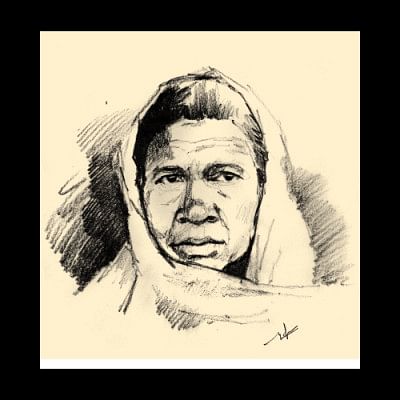Those We Have Collectively Failed Hiramoni Shaotal

Sketch: yafiz siddiqui
On the 2nd of March, Bangladesh beat Pakistan in the semi-finals of the recently concluded Asia Cup. It prompted an outpouring of patriotic love, supplanted by the tears of certain political figures, and oh, what a good time it was to a Bangladeshi. In the month of March, no less. A few hours after this, at dawn on the 3rd, Hiramoni Shaotal quietly passed away in her tin-shed hut in Chandpur Tea Estate. Her life was marked by a one-minute silence at a protest organized by the tea workers' to demand rights to their land. In that one-minute, the tea working population stood in silent revolt. Here was another body on which this country had built itself, and then left to starve by the wayside.
In history books, we sometimes read about the birangonas of the Liberation War, and we are told about the numerous accommodations and recognitions that the state has provided them. The story goes that Bangabandhu Sheikh Mujibur Rahman had loudly proclaimed that should any birangona be disowned by their families, then he would be their father, on certificates and identity registers. History is seldom as kind as it sounds. The pages of history are a wrestling match which, in our particular case, has been won by Bengali supremacy. And Hiramoni Shaotal is the collateral.
During the fateful months of independence, Hiramoni Shaotal was residing in Chandpur Tea Estate with her husband Laxman Shaotal. They had been able to escape in time as the Pakistani army had set up a camp directly on the Chandpur Tea Estate grounds. A few months before that, Bangabandhu Sheikh Mujibur Rahman had visited the tea gardens. He had intimated that war was imminent, and he asked the workers to arm themselves to protect themselves from the Pakistani army. Those who did not flee took up bows and arrows in the face of Pakistani tanks. Hiramoni Shaotal was raped in her own home by a group of Pakistani soldiers. She bore a child named Shohodev. Her husband Laxman stood by Hiramoni and the child. Shohodev passed away when he was around 22 years of age and Laxman Shaotal passed away soon after that. Since then, Hiramoni Shaotal had been living with her two daughters and trying to get by.
Like her entire family, Hiramoni Shaotal was a tea worker. She worked until it was no longer possible for her to work. Today, the daily wage of a tea worker is Tk.79. After retirement, Hiramoni Shaotal begged for money in order to feed her two daughters. The abuse she faced at the hands of the Pakistani army was not an isolated incident. It was not an unspoken consequence of war. It was part of the larger system of abuse that those like her face every day in liberated Bangladesh- the women, the indigenous, the tea worker, the poor.
Whose liberation do we remember in the history books? When we live through March every year, amid a cacophony of recorded speeches of March 7th and the proclamation of independence of March 26th, do we picture an independence for which Hiramoni Shaotal gave her life? Even with her passing some 45 years after independence, make no mistake that she died for/because of this country. She is a martyr and her poverty is our poverty, her pain is our collective shame.
When I first visited Chandpur Tea Estate and heard about Hiramoni Shaotal, I wanted to speak to her. This was two months ago, and by then, she had become too sick to meet people. She died quietly, but not shunned by her community- a community that the country has collectively left to starve under the yoke of colonialism to this day. Will there be a Hiramoni Shaotal highlighted on billboards next to a Shakib Al-Hassan?
The story of Hiramoni Shaotal is part of the dirty underbelly of a war that we have tried our best to forget- the sufferings of the indigenous, of the birangonas, of the millions who starved to death. The Bangladesh today is a glorious Bangladesh, where mention of the millions of freedom fighters who have since starved and died is not only ungentlemanly but also unsavoury. But millions like her will continue to haunt us, as we enjoy the amnesia of cricket, development and 3D-printing. Will we ever be brave enough to stand beside her community, who are fighting for their land? Will we ever be brave enough to admit that we have collectively failed her? In memory of her passing, I invite the readers to mourn with me. For our country, our mother and ourselves.

 For all latest news, follow The Daily Star's Google News channel.
For all latest news, follow The Daily Star's Google News channel. 



Comments